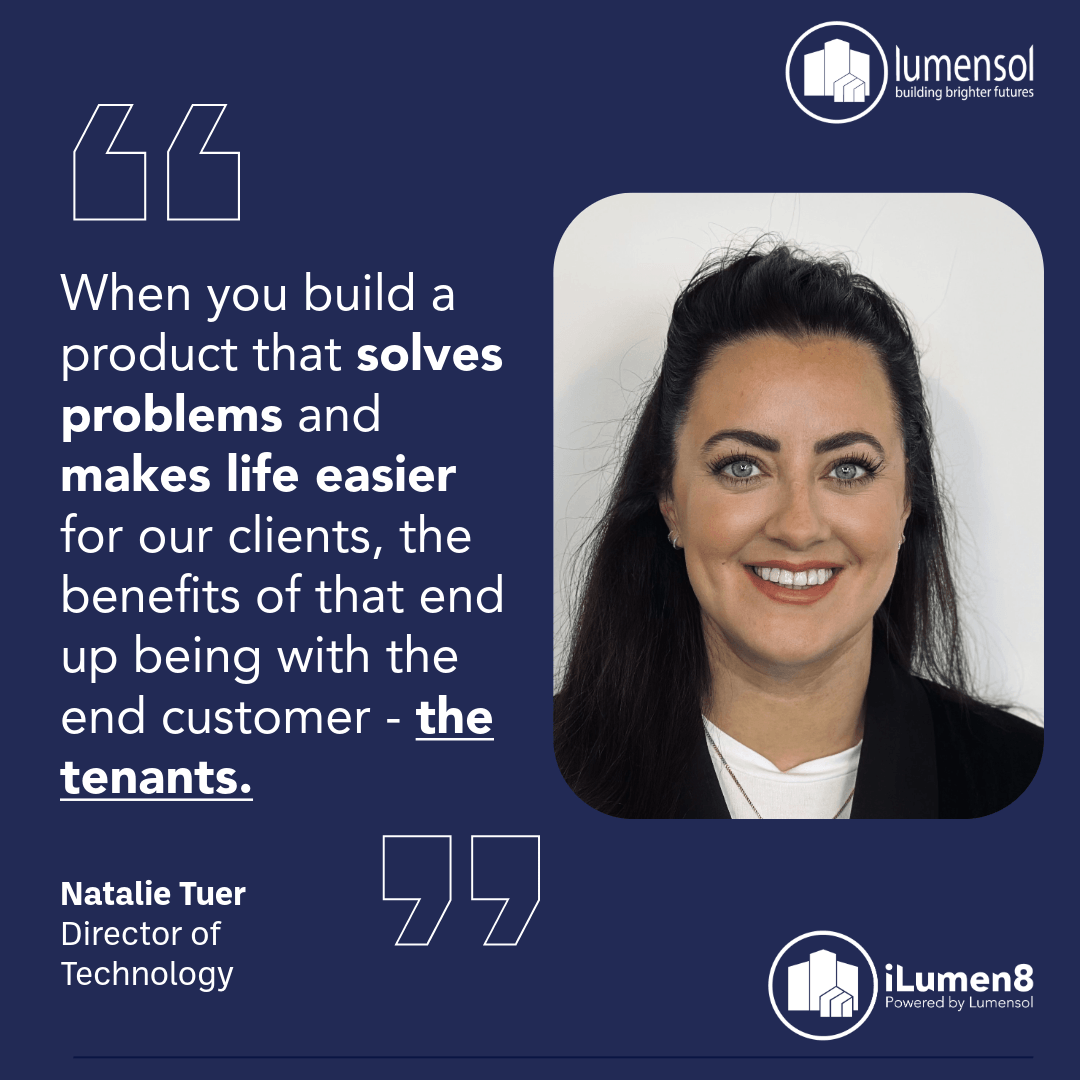
I’ve been building software for quite a while now. Before housing, I was building different tools and technology for the finance sector - cybersecurity, infrastructure, cloud hosting…all sorts.
Coming from outside the sector, like others at Lumensol, I feel is a strength, not a weakness. You bring different perspectives in from other sectors and use that to shape the way that these data tools are built.
Of course, you have to make sure that the tools we build make sense for the housing sector. That by using them, the ultimate benefits end up being with the “customer”. The tenants who live in those houses.
The whole ethos in social housing is to provide the best service possible to tenants; therefore, our technology should also do exactly that, even if they aren’t the ones actually interacting with it, or even know that it exists at all.
Right now, I’m working on the development of ilumen8. The technology we’ve developed in-house to help our clients with their data and reporting. Which, if we do it right, helps their customers.
As an example, in the case of iLumen8, being able to measure and track things like ‘Time to Job’ going down (the time it takes repairs and works to take place on a property) means that we’re seeing tenants get repairs done in their home faster than they were before. That’s a meaningful difference in people’s lives.
That’s a big part of why I was drawn to Lumensol in the first place. Don’t get me wrong, there are other things I enjoy here as well - everyone here really prides themselves on getting stuff done, which definitely suits me. But it’s the fact that we have this collection of very skilled operators, who all work extremely hard to improve the sector. I wanted to be a part of that.
The ethics and the positive goals of an organisation are really important to me. I wasn’t necessarily looking or expecting to end up working on social housing, but it all clicked in my head when the opportunity came up. A sector where the work I do can have a tangible positive effect on people.
It gives me a lot of confidence to work on developing this technology and putting it in the hands of our operators who have the knowledge and experience to put it to good use.
There is always going to be some resistance when you try to bring new technology into a sector, and it’s completely understandable. Budget is a factor, but there’s also the fact that you’re replacing a process that, yes, might be outdated, but it’s something people know and are used to.
Not everyone is tech-savvy, and you’re often asking people to learn something totally new to them. The last thing you want to do is add more steps to solving problems. Which is why I approach development with the mindset of the user as well as the eventual customer that benefits down the line.
When you build a product that solves problems and makes life easier for the user, the benefits of that end up being with the end customer - in this case, a tenant.
Every housing provider is different. Different budgets, different levels of staff, different processes. But each of them is on a data journey of their own. Some have executed it very well, while others may be catching up. It’s not that collecting and using data is a brand new topic, it’s that integrating all of that and understanding how to get the most out of it is challenging for any organisation.
“AI” is the latest one.
The point of using AI really is to be able to find the clues that are somewhat hidden in these massive datasets to understand what you, as an organisation, should be able to do next.
It can be an extremely useful tool, but it has to be implemented and used correctly, just like any other technology. You have to have the right data, use the right AI tools, ask the right questions, otherwise, it’s not going to give you the outcome you need.
In practical ways, and what we’re developing for use in the very near future, is the ability for landlords to easily see which houses will need what work done, without needing a person to report a problem or needlessly visually inspect a property.
The data will tell us that certain properties will need attention sooner than others, but when there are thousands of properties, each with their own history, the computational power of AI tools is needed to make that process fast and efficient.
And we’re working to make sure that these developments end up benefiting the sector and the people in it first and foremost.
I’m quite proud of working in tech - it’s a sector that is so interesting. A sector where traditionally not a lot of women get to work in leadership roles, and a sector where the work I’m doing is genuinely helping people.
I do think my younger self would be quite surprised that I ended up working in technology. I certainly never considered myself to be particularly tech-savvy growing up - nowadays I’m tech support for my whole family!
But now that I’m here, I am genuinely excited to be working in this sector at a time when I do think data and technology are going to make a massive difference in the near future. It’s going to be interesting to see what the next 20 years look like for social housing, and especially the data and technology side of social housing.
And I’m going to keep working hard to try and help shape some of that future.
